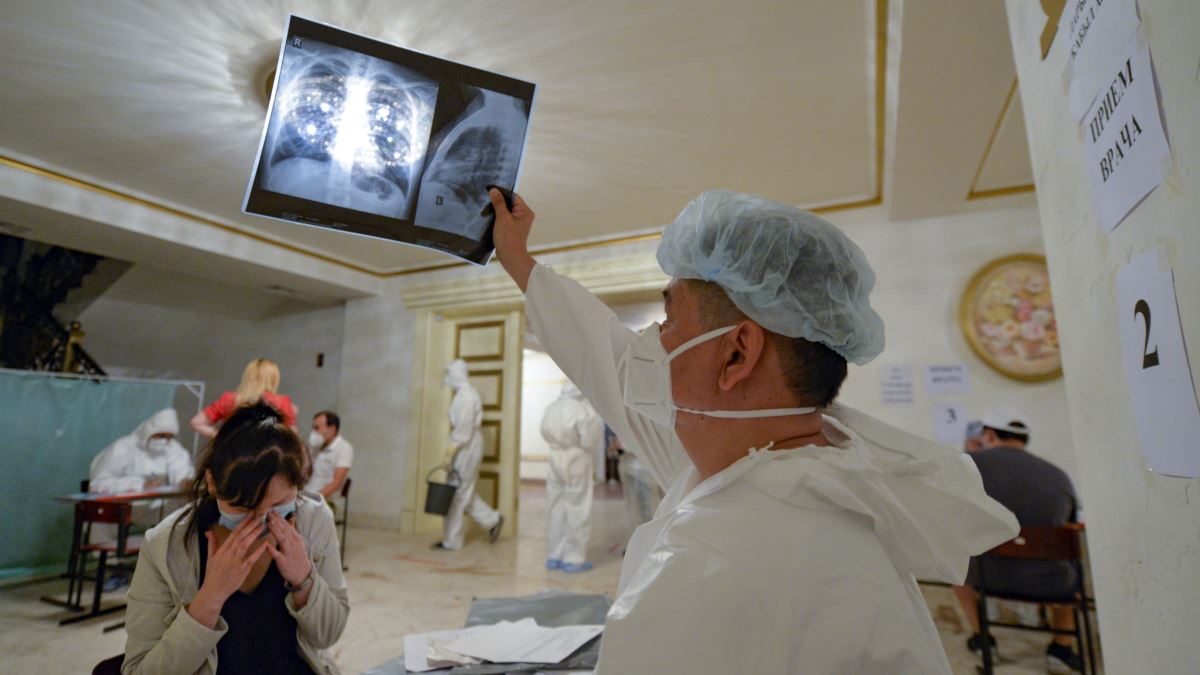
Kyrgyzstan has gone through some really rough times this year.
The country has the highest official rate of coronavirus cases in Central Asia and the highest mortality rate, which has had a knock-on effect that has sent the economy plummeting.
And for good measure, protesters ousted the president and government in early October.
So the country’s new leadership was looking for help and found it in a very unexpected place: right next door.
Kazakh President Qasym-Zhomart Toqaev’s press service released a statement on November 12 that said Kazakhstan and Uzbekistan will be providing financial and humanitarian aid to Kyrgyzstan.
The Uzbek info site gazeta.uz reported the same day about a phone call between Toqaev and his Uzbek counterpart, Shavkat Mirziyoev, during which they agreed “on joint measures aimed at ensuring stability and safety in the region, and additionally on economic and humanitarian help for the Kyrgyz people.”
The report noted Kyrgyzstan’s debt stands at $4.5 billion and more than 42 percent of that is owed to China.
There were no details about the amount of financial and humanitarian aid the two countries would send to Kyrgyzstan, but the groundwork for the announcement was made several days in advance.
New Kyrgyz Foreign Minister Ruslan Kazakbaev visited Kazakhstan on October 29 and Uzbekistan on November 5-6, requesting help from both neighbors — each of which said “yes.”
The financial support Kazakhstan and Uzbekistan intend to provide is aimed at supporting Kyrgyzstan’s budget and ensuring food security.
Kazakhstan and Uzbekistan also both agreed to send medicine and hospital equipment to help Kyrgyzstan battle the coronavirus, and Uzbekistan reportedly agreed to help build a “medical and health institution.”
This seems to be exactly the sort of help Kyrgyzstan needs at the moment, especially after the Kremlin froze $100 million in financial aid it had earlier earmarked for Kyrgyzstan as a way of showing its displeasure at this third change of leadership in 15 years due to mass protests.
More interesting is that Kazakhstan and Uzbekistan are cooperating to aid their ailing neighbor.
The three countries signed an Eternal Friendship treaty in Bishkek on January 10, 1997, when all had different presidents. But that proved to be a rather meaningless document.
In November 1998, Kazakhstan and Uzbekistan signed their own bilateral Eternal Friendship treaty.
For most of the nearly 30 years of Central Asia’s independence, Kazakh-Kyrgyz relations have been the best bilateral relations in the entire region. But that’s not saying much.
Kazakh President Toqaev made reference to that when Kyrgyz Foreign Minister Kazakbaev visited recently.
“Kazakhstan and Kyrgyzstan are the closest governments,” Toqaev told his Kyrgyz guest. “Nothing separates us; on the contrary, there are many factors that unite us.”
And that despite former Kyrgyz President Almazbek Atambaev’s tirades against Kazakhstan in late 2017 that led Kazakhstan to close its border with Kyrgyzstan and, in response, caused Kyrgyzstan to make an own goal by refusing $100 million that Kazakhstan was prepared to give Kyrgyzstan to help it integrate into the Eurasian Economic Union (made up of Russia, Armenia, Belarus, Kazakhstan, and Kyrgyzstan).
Clearly those fences have been mended.
Under Mirziyoev’s predecessor, Islam Karimov, Uzbekistan was no friend to either Kazakhstan or Kyrgyzstan. The latter especially suffered as Uzbekistan often closed the 1,388-kilometer Uzbek-Kyrgyz border.
Mirziyoev can be credited for making good on his early promise after coming to power in September 2016 to improve relations with all of Uzbekistan’s immediate neighbors.
Had the pandemic hit before he died in 2016, it is unlikely Karimov would have offered anything to Kyrgyzstan, except possibly some criticism of the way the Kyrgyz government was handling a health crisis.
It is also interesting that the statement on Kazakhstan and Uzbekistan mentioned taking joint measures to ensure “stability and safety in the region.”
This somewhat echoes an October 9 joint statement in the wake of the ouster of Kyrgyzstan’s government from the leaders of Kazakhstan, Tajikistan, Turkmenistan, and Uzbekistan that expressed concern about “events happening in fraternal Kyrgyzstan,” but also mentioned that the “well-being of Kyrgyzstan is an important factor for regional security and sustainable development throughout Central Asia.”
The statement was issued by Toqaev’s office, but the impetus for arranging this unprecedented joint statement of Central Asian leaders almost surely came from discussions between Toqaev and Mirziyoev.
Tajikistan and Turkmenistan are so introverted and have so many of their own domestic problems that it is difficult to see how the leaders in either country would have initiated such a statement.
Uzbekistan has emerged as a regional partner and, increasingly, Tashkent and Nur-Sultan are consulting on regional matters.
Kazakhstan and Uzbekistan should be the dominant states of Central Asia.
Regionally, they are the most powerful economically, militarily, and in terms of population size. But previously they found it difficult to cooperate, again mainly due to Karimov’s obstinateness.
Among the first fruits of Kazakh-Uzbek cooperation may be an improvement in the situation in Kyrgyzstan. Encouragingly, the Kazakh and Uzbek governments are talking about “regional” security and stability, which could lessen the dependence of all five Central Asian states on outside help — namely Russia or China — when problems arise.
PrintRadio Free | Radio Free (2020-11-14T11:45:19+00:00) A New Era Of Central Asian Cooperation? Uzbekistan, Kazakhstan Help A Neighbor In Need. Retrieved from https://www.radiofree.org/2020/11/14/a-new-era-of-central-asian-cooperation-uzbekistan-kazakhstan-help-a-neighbor-in-need/
Please log in to upload a file.
There are no updates yet.
Click the Upload button above to add an update.
